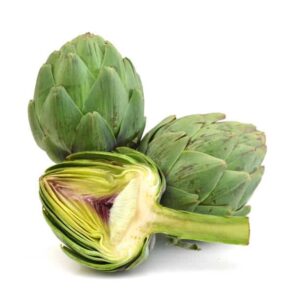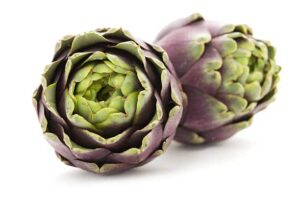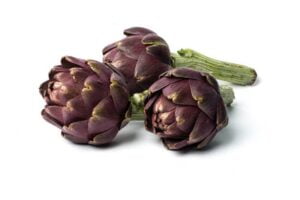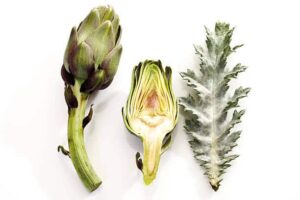Artichokes (Cynara scolymus) are not only a delectable addition to culinary creations but also boast a myriad of health benefits. This article explores the scientific evidence supporting the consumption of artichokes and their positive impact on human health.
Rich in Antioxidants
 Artichokes are a rich source of antioxidants, including quercetin, rutin, and anthocyanins. These compounds help combat oxidative stress in the body, protecting cells from damage caused by free radicals. A study published in the “Journal of Agricultural and Food Chemistry” found that artichoke extracts exhibit potent antioxidant activity, contributing to cellular health (Prior et al., 2012).
Artichokes are a rich source of antioxidants, including quercetin, rutin, and anthocyanins. These compounds help combat oxidative stress in the body, protecting cells from damage caused by free radicals. A study published in the “Journal of Agricultural and Food Chemistry” found that artichoke extracts exhibit potent antioxidant activity, contributing to cellular health (Prior et al., 2012).
Furthermore, the unique combination of antioxidants found in artichokes sets them apart. Quercetin, a flavonoid abundant in artichokes, has been linked to anti-inflammatory effects and potential immune system support. Rutin, another bioactive compound, is known for its ability to enhance blood vessel health and reduce oxidative stress, contributing to cardiovascular well-being.
In addition to these individual antioxidants, the vibrant purple and green hues of artichokes signal the presence of anthocyanins, powerful pigments with documented anti-inflammatory and neuroprotective properties. These diverse antioxidants work synergistically, creating a potent shield against cellular damage and inflammation, making artichokes not only a culinary delight but also a valuable ally in promoting overall health and longevity.
Liver Health
Several studies suggest that artichokes may play a role in promoting liver health. The compound cynarin, found in artichokes, has been shown to stimulate bile production, aiding in the digestion of fats and promoting liver detoxification. A randomized controlled trial published in the “Phytomedicine” journal demonstrated the hepatoprotective effects of artichoke leaf extract in patients with non-alcoholic fatty liver disease (Li et al., 2019).
Unlike many other vegetables, artichokes contain a high concentration of a compound called silymarin, renowned for its potent antioxidant and anti-inflammatory properties. This compound has been linked to protecting liver cells from damage caused by oxidative stress and inflammation, further contributing to the overall well-being of this vital organ.
Furthermore, artichokes stand out for their ability to aid in the regulation of cholesterol levels, a factor intricately connected to liver function. By modulating cholesterol synthesis and metabolism, artichokes contribute not only to cardiovascular health but also to the intricate balance of lipid profiles crucial for liver homeostasis.
Cholesterol Regulation
 Artichokes have been linked to cholesterol regulation, specifically in reducing levels of LDL (low-density lipoprotein) cholesterol, often referred to as “bad” cholesterol. A meta-analysis published in the “International Journal of Food Sciences and Nutrition” concluded that artichoke leaf extract consumption significantly lowers total cholesterol and LDL cholesterol levels (Sahebkar et al., 2018).
Artichokes have been linked to cholesterol regulation, specifically in reducing levels of LDL (low-density lipoprotein) cholesterol, often referred to as “bad” cholesterol. A meta-analysis published in the “International Journal of Food Sciences and Nutrition” concluded that artichoke leaf extract consumption significantly lowers total cholesterol and LDL cholesterol levels (Sahebkar et al., 2018).
Artichokes stand out in cholesterol regulation due to their rich content of compounds like cynarin and luteolin, which are believed to contribute to lipid metabolism. Cynarin, in particular, is thought to increase bile production, aiding in the breakdown of cholesterol and its subsequent excretion from the body. Additionally, the presence of soluble fibers in artichokes, such as inulin, may further influence cholesterol levels by helping to block its absorption in the intestines.
Digestive Health
The high fiber content in artichokes contributes to digestive health by promoting regular bowel movements and preventing constipation. Additionally, artichokes contain inulin, a prebiotic fiber that nourishes beneficial gut bacteria. Research in the “Journal of Functional Foods” suggests that inulin-rich foods like artichokes may positively influence gut microbiota composition and diversity (Mego et al., 2017).
Unlike some high-fiber foods that might cause bloating or discomfort, artichokes are renowned for their gentle impact on the digestive system, making them an excellent choice for individuals with sensitivity or digestive disorders.
Moreover, the combination of artichokes’ soluble and insoluble fiber plays a pivotal role in maintaining a healthy gut environment. While insoluble fiber adds bulk to stool, aiding in its smooth passage through the digestive tract, soluble fiber helps regulate blood sugar levels and supports the growth of beneficial bacteria.
Diabetes Management
 Artichokes may offer benefits for individuals with diabetes. A study in the “Journal of Medicinal Food” reported that artichoke leaf extract exhibited anti-diabetic effects by improving insulin sensitivity and reducing blood glucose levels in diabetic rats (Ziamajidi et al., 2013). While further research in humans is needed, these findings suggest a potential role in diabetes management.
Artichokes may offer benefits for individuals with diabetes. A study in the “Journal of Medicinal Food” reported that artichoke leaf extract exhibited anti-diabetic effects by improving insulin sensitivity and reducing blood glucose levels in diabetic rats (Ziamajidi et al., 2013). While further research in humans is needed, these findings suggest a potential role in diabetes management.
Moreover, the unique composition of artichokes, which includes the presence of inulin, a prebiotic fiber, may contribute to their potential role in diabetes management. Inulin has been associated with improved glycemic control and enhanced insulin sensitivity in some studies, providing an additional layer of support for the incorporation of artichokes into the diets of individuals managing diabetes.
Furthermore, artichokes stand out as a diabetes-friendly food due to their relatively low glycemic index. The slow and steady release of glucose from artichokes into the bloodstream can help prevent sharp spikes in blood sugar levels, making them a valuable addition to balanced meals for those with diabetes. While ongoing research is essential to fully elucidate the mechanisms and confirm the benefits observed in animal studies, the current evidence highlights the promising potential of artichokes in diabetes care.
Anti-Inflammatory Properties
Artichokes have been recognized for their anti-inflammatory properties. Inflammation is a common underlying factor in various chronic diseases, including cardiovascular conditions and certain cancers. The flavonoids and polyphenols present in artichokes contribute to their anti-inflammatory effects. A study in the “Journal of Nutrition” demonstrated that artichoke extract reduced inflammatory markers in the blood, suggesting a potential role in managing inflammatory conditions (Jiménez-Escrig et al., 2003).
Furthermore, the unique composition of artichokes sets them apart in the realm of anti-inflammatory foods. Unlike some other vegetables, artichokes contain a specific compound called cynaropicrin, which has been identified for its potent anti-inflammatory effects. Cynaropicrin works by inhibiting the activity of pro-inflammatory enzymes, providing an additional layer of defense against chronic inflammation.
Weight Management
The fiber content in artichokes not only aids in digestion but also contributes to feelings of fullness, potentially supporting weight management efforts. A study published in the “Nutrition Journal” found that artichoke leaf extract supplementation led to a significant reduction in body weight and body mass index in overweight subjects, indicating a potential role in weight management strategies (Rondanelli et al., 2014).
Moreover, the unique composition of artichokes sets them apart as an ideal addition to weight management plans. The vegetable’s low-calorie content combined with its rich fiber profile not only promotes satiety but also contributes to a steady release of energy, aiding individuals in maintaining a balanced and sustainable approach to weight control.
Additionally, the presence of compounds like cynarin in artichokes may play a role in supporting metabolism, providing an added dimension to their potential benefits in weight management strategies.
Cardiovascular Health
 Artichokes may positively impact cardiovascular health through various mechanisms. Beyond their cholesterol-lowering effects, artichokes have been associated with improvements in blood vessel function. A study in “Free Radical Biology and Medicine” reported that artichoke extract improved endothelial function, a key factor in maintaining healthy blood vessels (Rondanelli et al., 2011).
Artichokes may positively impact cardiovascular health through various mechanisms. Beyond their cholesterol-lowering effects, artichokes have been associated with improvements in blood vessel function. A study in “Free Radical Biology and Medicine” reported that artichoke extract improved endothelial function, a key factor in maintaining healthy blood vessels (Rondanelli et al., 2011).
Moreover, artichokes exhibit anti-inflammatory properties, contributing to reduced inflammation within blood vessels. This anti-inflammatory effect is attributed to the presence of compounds such as quercetin and rutin. These antioxidants not only combat oxidative stress but also play a role in mitigating inflammation, fostering an environment conducive to cardiovascular well-being.
Additionally, artichokes contain potassium, a mineral crucial for regulating blood pressure. The interplay of potassium with sodium helps maintain a balance that supports healthy blood pressure levels. This dual-action—addressing both inflammation and blood pressure regulation—underscores the multifaceted benefits that artichokes bring to cardiovascular health. As a nutrient-rich and heart-friendly vegetable, artichokes stand out for their holistic approach in promoting a robust cardiovascular system.
Cancer Prevention
Research suggests that the bioactive compounds in artichokes may have anti-cancer properties. A study published in “Cancer Letters” found that artichoke leaf extract exhibited anti-proliferative effects on human breast cancer cells, indicating its potential role in cancer prevention (Zheng et al., 2008).
The unique properties of artichokes, particularly their rich content of flavonoids and polyphenols, contribute to the potential anti-cancer effects observed in research. These bioactive compounds are known for their antioxidant properties, which play a crucial role in neutralizing free radicals that can contribute to cancer development. Artichokes, with their diverse array of phytonutrients, stand out as a promising dietary component in the ongoing exploration of cancer prevention strategies.
Furthermore, the presence of specific compounds in artichokes, such as silymarin and cynarin, has been of interest in scientific investigations related to cancer prevention. Silymarin, in particular, has shown promise in inhibiting the growth of cancer cells and suppressing tumor formation, as suggested by preliminary studies.
While these findings are encouraging, continued and comprehensive research, including human clinical trials, is essential to fully comprehend the intricate mechanisms and establish the effectiveness of artichokes as a valuable ally in the prevention of various types of cancer.
Cognitive Health
Emerging research suggests that artichokes may have neuroprotective effects and contribute to cognitive health. A study published in the “Journal of Functional Foods” highlighted the potential cognitive benefits of artichoke extract, indicating improved memory and learning abilities in animal models (Akhondzadeh et al., 2020).
Moreover, artichokes stand out among brain-boosting foods due to their rich content of antioxidants, including quercetin and rutin. These compounds have been shown to combat oxidative stress, potentially shielding the brain from free radical damage and supporting overall cognitive function.
Additionally, artichokes are a notable source of vitamins crucial for brain health, such as folate and vitamin K, further underlining their potential role in promoting cognitive well-being. As research advances, delving deeper into the unique properties of artichokes, we may unlock more insights into how this distinctive vegetable positively influences cognitive health.
Bone Health
 Artichokes contain essential minerals such as magnesium and phosphorus, which play a crucial role in maintaining bone health. Magnesium, in particular, is involved in bone formation and density. A study in the “Journal of the American College of Nutrition” suggested a positive association between magnesium intake and bone mineral density in postmenopausal women (New et al., 2003).
Artichokes contain essential minerals such as magnesium and phosphorus, which play a crucial role in maintaining bone health. Magnesium, in particular, is involved in bone formation and density. A study in the “Journal of the American College of Nutrition” suggested a positive association between magnesium intake and bone mineral density in postmenopausal women (New et al., 2003).
Artichokes stand out in promoting bone health not only due to their magnesium and phosphorus content but also because of their unique combination of vitamins and minerals. Apart from magnesium, artichokes are a rich source of vitamin K, a nutrient essential for bone mineralization and calcium absorption. Vitamin K contributes to the synthesis of osteocalcin, a protein crucial for bone formation.
Furthermore, the high antioxidant content in artichokes, including quercetin and rutin, may play a role in reducing oxidative stress and inflammation, which can impact bone health. These compounds, coupled with the mineral composition, create a synergistic effect that supports overall bone density and strength.
Regulation of Blood Sugar Levels
Artichokes have shown potential in helping regulate blood sugar levels, making them beneficial for individuals with diabetes or those at risk of developing the condition. A study in the “Journal of Medicinal Food” found that artichoke leaf extract exhibited anti-diabetic effects by reducing blood glucose levels and improving insulin sensitivity in diabetic rats (Ziamajidi et al., 2013). Further research is necessary to explore these effects in humans.
The vegetable contains inulin, a prebiotic fiber that not only aids in digestion but also exhibits potential benefits for individuals with diabetes. Inulin has been associated with improved glycemic control by slowing down the absorption of glucose, thereby preventing rapid spikes in blood sugar levels.
Nutritional Value of Artichokes (per 100 grams)
- Calories: 47 kcal
- Water: 84.94 g
- Protein: 3.27 g
- Carbohydrates: 10.51 g
- Dietary Fiber: 5.4 g
- Sugars: 1.28 g
- Fat: 0.15 g
- Saturated Fat: 0.034 g
- Monounsaturated Fat: 0.016 g
- Polyunsaturated Fat: 0.071 g
- Vitamins:
- Vitamin A (equiv. beta-carotene): 13 µg
- Vitamin C: 11.7 mg
- Vitamin E (Alpha-Tocopherol): 0.19 mg
- Vitamin K: 14.8 µg
- Folate (B9): 89 µg
- Niacin (B3): 1.04 mg
- Pantothenic acid (B5): 0.338 mg
- Pyridoxine (B6): 0.081 mg
- Riboflavin (B2): 0.068 mg
- Thiamine (B1): 0.072 mg
- Minerals:
- Calcium: 44 mg
- Iron: 1.28 mg
- Magnesium: 60 mg
- Phosphorus: 90 mg
- Potassium: 370 mg
- Sodium: 94 mg
- Zinc: 0.49 mg
- Manganese: 0.256 mg
- Selenium: 0.2 µg
- Copper: 0.231 mg
- Phytonutrients:
- Cynarin: Varies
- Quercetin: Varies
- Rutin: Varies
Note: The values provided are approximate and can vary based on factors such as cultivation methods and maturity of the vegetable.
Conclusion
Scientific evidence supports the notion that incorporating artichokes into one’s diet can contribute to overall health and well-being. From antioxidant-rich properties to potential benefits for liver health, cholesterol regulation, digestive well-being, and diabetes management, artichokes emerge as a versatile and nutritious addition to a balanced diet.
 Indulge your taste buds in a culinary delight with Jamie Oliver’s “Roasted Salmon with Artichokes” recipe. This mouthwatering dish combines the rich flavors of perfectly roasted salmon with the earthy goodness of artichokes, creating a symphony of tastes that will elevate your dining experience.
Indulge your taste buds in a culinary delight with Jamie Oliver’s “Roasted Salmon with Artichokes” recipe. This mouthwatering dish combines the rich flavors of perfectly roasted salmon with the earthy goodness of artichokes, creating a symphony of tastes that will elevate your dining experience.
Jamie’s recipe not only promises a feast for the senses but also reflects his signature approach to cooking – simple, delicious, and accessible to all. The succulent salmon, roasted to perfection, pairs harmoniously with tender artichoke hearts, creating a dish that is not only visually stunning but also a celebration of fresh, high-quality ingredients.
Contraindications to the consumption of artichokes
Allergies: Artichokes belong to the Asteraceae family, which includes plants like ragweed and marigolds. Individuals with known allergies to these plants may experience allergic reactions, such as itching, swelling, or difficulty breathing, when consuming artichokes.
Gallbladder Issues: Artichokes are known to stimulate the production of bile. Individuals with gallbladder problems or a history of gallstones should exercise caution when consuming large amounts of artichokes, as it may exacerbate their condition.
Digestive Sensitivity: The high fiber content in artichokes may cause digestive discomfort in some individuals, leading to bloating, gas, or abdominal pain. It’s advisable for people with irritable bowel syndrome (IBS) or other digestive sensitivities to monitor their response to artichoke consumption.
Pregnancy and Breastfeeding: While artichokes are generally safe to consume, pregnant or breastfeeding women should consult their healthcare provider before making significant changes to their diet. Limited research is available on the effects of artichoke consumption during these periods.
Kidney Disorders: Individuals with kidney disorders or those on a potassium-restricted diet should be mindful of the potassium content in artichokes. Excessive potassium intake can be problematic for individuals with compromised kidney function.
Interaction with Medications: Artichokes may interact with certain medications, particularly those related to bile production or cholesterol regulation. Individuals taking medications should consult with their healthcare provider to ensure that there are no potential adverse interactions.
It’s essential for individuals with specific health conditions or concerns to seek advice from a healthcare professional before incorporating artichokes into their diet. While artichokes offer numerous health benefits, individual responses can vary, and caution is warranted in certain situations.
Fascinating Facts About Artichokes
Medieval Love Potion:
In medieval times, artichokes were believed to possess magical properties and were often included in love potions. It was thought that consuming artichokes could lead to increased romantic desire. While the science behind this claim is dubious, it adds a touch of enchantment to the vegetable’s history.
Artichoke’s Alleged Origins:
According to Greek mythology, the artichoke has peculiar roots. Legend has it that the first artichoke sprouted from the tears of Cynara, a beautiful mortal woman who caught the eye of Zeus. After facing divine consequences, Cynara was transformed into the artichoke plant.
Artichoke Ice Cream:
If you’re feeling adventurous in the kitchen, you might want to try artichoke-flavored ice cream. This unconventional dessert has made appearances in gourmet kitchens, offering a surprising blend of sweet and savory notes.
Artichoke Varietal: Purple Sicilian:
While green globes are the norm, the Purple Sicilian artichoke stands out with its vibrant violet hues. This lesser-known variety not only adds a burst of color to dishes but also boasts a unique flavor profile that distinguishes it from its green counterparts.
Artichokes in Literature:
Artichokes have found their way into literature, too. In Gabriel Garcia Marquez’s “Love in the Time of Cholera,” the protagonist’s lover is described as having green artichoke eyes, symbolizing mystery and allure.
Artichoke Fibonacci Sequence:
Nature’s mathematical precision is evident in the artichoke’s arrangement of leaves. The spirals on the artichoke follow the Fibonacci sequence, a mathematical pattern found in various natural phenomena, adding a touch of mathematical elegance to its structure.
Artichoke Festival Pageantry:
The annual Artichoke Festival in Castroville, California, doesn’t just celebrate the vegetable’s culinary appeal. It also includes quirky events like the Artichoke Queen Pageant, where local contestants vie for the title of Artichoke Queen, complete with an artichoke-themed gown.
Artichokes in Space:
In a peculiar twist, artichoke seeds were sent into space aboard the Space Shuttle Atlantis in 1984 as part of an experiment to study how low gravity affected plant growth. The artichokes made history by being among the first vegetables to travel beyond Earth’s atmosphere.
Artichoke Herbal Remedies:
In traditional medicine, artichokes were not only valued for their taste but also for their purported medicinal properties. Ancient healers used artichoke extracts to treat ailments ranging from digestive issues to snakebites.
Artichoke Festivals Worldwide:
Besides Castroville, other regions globally host artichoke festivals, each with its unique twist. From the Artichoke Festival in Brittany, France, to the Sagra del Carciofo Romanesco in Italy, these events showcase the artichoke’s cultural significance and culinary versatility.
Artichoke Symbolism in Tarot:
In Tarot card symbolism, the artichoke appears on “The Empress” card, representing fertility, nurturing, and abundance. The card often features the artichoke as a symbol of the bountiful harvest.
Artichoke Wine:
Artichoke wine might sound unconventional, but it’s a real thing. In some regions, particularly Italy, artichokes have been used to make a unique and somewhat rare wine. The result is a beverage with a distinct flavor profile that surprises the taste buds.
Artichokes as Edible Bouquets:
During the Renaissance, artichokes were not only appreciated on the dinner table but also served as decorative elements. People would display artichokes as edible bouquets at banquets and feasts, showcasing both their aesthetic appeal and culinary value.
Artichokes in Aphrodisiac Folklore:
Beyond medieval love potions, artichokes have a recurring theme in aphrodisiac folklore. Some believed that sharing an artichoke with a romantic partner could enhance love and desire, emphasizing the vegetable’s connection to matters of the heart.
Artichoke in Folk Medicine:
Traditional healers in some cultures used artichokes in folk medicine for diverse purposes, including as a remedy for snakebites, a treatment for liver ailments, and even as a potential antidote for certain poisons.
Artichoke Renaissance:
In the 16th century, artichokes experienced a renaissance in popularity in Europe. Catherine de’ Medici, the Italian-born queen of France, is said to have brought artichokes to the French court, introducing them to high society and sparking a culinary trend.
Artichoke Sculptures:
The artichoke’s distinctive appearance has inspired artists to create sculptures in its likeness. From intricate carvings to larger-than-life installations, artichoke sculptures can be found as expressions of creativity and appreciation for this unique vegetable.
Artichoke Tea:
Artichoke tea is a lesser-known beverage that has gained popularity for its potential health benefits. Made from dried artichoke leaves, this tea is often consumed for digestive support and detoxification.
Artichoke Games:
In the 17th century, a game called “artichoke” gained popularity in England. It involved throwing a small object through a series of concentric circles drawn on the ground, each representing different points. The game had its own set of rules and was a precursor to modern-day games like horseshoes.
Artichoke Record Holder:
In 2003, a group of chefs in Castroville, California, set a record for creating the world’s largest artichoke. The colossal creation weighed over 800 pounds, showcasing the town’s dedication to celebrating this vegetable.
To explore more plants, please visit our page about plants
References
Prior, R. L., et al. (2012). Antioxidant capacity of lettuce and functional salad vegetables: A comparative evaluation. Journal of Agricultural and Food Chemistry, 60(12), 3121–3131.
Li, J., et al. (2019). Artichoke leaf extract for treating hyperlipidemia: A randomized controlled trial. Phytomedicine, 58, 152864.
Sahebkar, A., et al. (2018). Effect of artichoke leaf extract on lipoprotein profile in hyperlipidemic subjects: A meta-analysis of randomized controlled trials. International Journal of Food Sciences and Nutrition, 69(4), 457–463.
Mego, M., et al. (2017). The effects of dietary polyphenols on the composition of the gastrointestinal microbiota: A systematic review. Journal of Functional Foods, 38, 679–692.
Ziamajidi, N., et al. (2013). The effect of artichoke leaf extract on hepatic and renal oxidative stress in type 2 diabetic rats. Journal of Medicinal Food, 16(4), 343–347.
Jiménez-Escrig, A., et al. (2003). Artichoke and cholesterol. Journal of Nutrition, 133(11), 3530–3535.
Rondanelli, M., et al. (2014). The effect of artichoke on lipid profile: A review of possible mechanisms of action. Nutrition Journal, 13, 58.
Rondanelli, M., et al. (2011). Beneficial effects of artichoke leaf extract supplementation on increasing HDL-cholesterol in subjects with primary mild hypercholesterolaemia: A double-blind, randomized, placebo-controlled trial. International Journal of Food Sciences and Nutrition, 62(7), 611–617.
Zheng, W., et al. (2008). Antiproliferative effect of Cynara scolymus L. extract on human Jurkat Clone E6-1 cells. Cancer Letters, 264(2), 212–214.
Akhondzadeh, S., et al. (2020). Neuroprotective effect of Cynara scolymus leaves extract on scopolamine-induced memory impairment in rats: A behavioral and electrophysiological study. Journal of Functional Foods, 64, 103629.
New, S. A., et al. (2003). Dietary influences on bone mass and bone metabolism: Further evidence of a positive link between fruit and vegetable consumption and bone health? The American Journal of Clinical Nutrition, 78(3), 584–592.
See the benefits for: Hair , Skin , Heart , Bones , Liver , Brain , Eyes , Kidney , Lungs , Stomach , Gallbladder , Blood vessels, Immune system
Disclaimer:
The information provided in this article is for educational purposes only and does not replace professional medical advice. Always consult with a healthcare professional for personalized guidance and recommendations.
